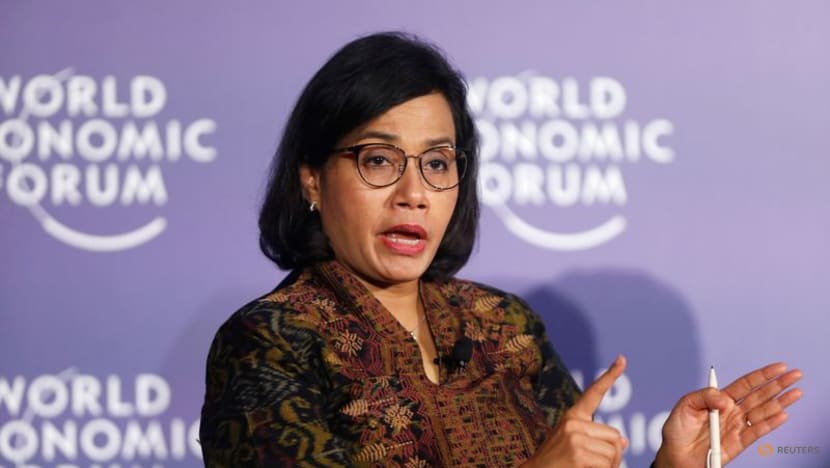Commentary: Can respected Indonesian Finance Minister Sri Mulyani campaign all the way to the top?
Indonesia’s finance minister has built a brand for cracking down on corruption. But what wins her public trust makes her politically vulnerable, says this writer.

File photo. Indonesia's Finance Minister Sri Mulyani Indrawati at the World Economic Forum on ASEAN at the Convention Center in Hanoi, Vietnam on Sep 12, 2018. (Photo: Reuters/Kham)
SYDNEY: Last month, a young man jumped into his Jeep Rubicon, picked up a friend and drove out to South Jakarta where he allegedly beat another young man so badly he was hospitalised in a coma. What initially seemed to be an especially violent incident among the capital’s young elite has since exploded into an anti-corruption crackdown.
It has also sparked fresh calls for Finance Minister Sri Mulyani Indrawati, who returned to the Cabinet under a President Joko Widodo shake-up in 2016, to take her brand of zero-tolerance on corruption nation-wide - perhaps even as far as seeking a top job for herself in next year’s election. But could she do it?
The alleged suspect in the assault case is the son of tax official Rafael Alun Trisambodo, himself facing a second anti-corruption investigation, and his son’s ostentatious display of wealth didn’t go down well online. There were calls for a boycott on paying taxes this year - with a deadline of Mar 31 for returns, the threats appeared particularly hairy for the minister.
Under a lesser head, the scandal may have threatened to blow up their leadership - but not for Sri Mulyani Indrawati. She quickly vowed to sanction the official, and others who have since come under scrutiny, and promised a crackdown.
FULL CIRCLE FOR SRI MULYANI
It’s a full-circle moment for the US and Indonesian-educated economist. During Sri Mulyani’s first stint as finance minister in 2005 under president Susilo Bambang Yudhoyono, she took on corruption and mismanagement in the tax directorate in reforms that eventually saw foreign investment near double within a year.
“Yet what was good for investors and Indonesian workers didn’t win Ms Sri Mulyani many friends,” the Wall Street Journal put it five years later when she left the Cabinet to join the World Bank as a managing director.
A spat with powerful businessman and then-head of the Golkar Party, Aburizal Bakrie, left Sri Mulyani with few options. The global financial crisis-era bailout under her direction of Bank Century - a move Sri Mulyani still backed during a hearing with the Corruption Eradication Commission in 2014 - was weaponised by her opponents.
Hamstrung and left with little support, the politically unaligned Sri Mulyani is widely viewed to have jumped rather than been pushed.
The dogged commitment to remain unaligned is both a serious vulnerability, as her CV in Jakarta has shown, and the source of immense trust and respect among observers both at home and abroad.
Sri Mulyani remains a constant in the top half of Forbes’ global annual 100 Most Powerful Women list and is repeatedly floated as a potential candidate for higher office - most recently in a Jakarta Post editorial arguing her performance during this current scandal is the leadership Indonesia deserves in a vice-president.
Beyond never appearing to want political leadership, Sri Mulyani’s technocratic style is at odds with what most vibrant, if challenged, democracies such as Indonesia produce. More familiar in style, perhaps, to the halls of Brussels, the finer details of fiscal policy are hardly exciting to would-be voters who are accustomed to the flamboyant campaigning of Indonesia’s pesta demokrasi (Festival of Democracy).
INDONESIA’S FEW BUT EXTRAORDINARILY POWERFUL WOMEN LEADERS
And then, of course, there’s gender. With Megawati Sukarnoputri, Indonesia has had a female president before, but as analysts have noted, powerful conservative Islamic voices have repeatedly sought to argue that women should not be in leadership roles.
Many of the complaints about Megawati boiled down to issues with presentation and communication - living under the shadow of her father and the country’s first president Sukarno didn't help.
While no one would accuse Sri Mulyani of speaking too informally, the perception of women’s leadership is deeply rooted and difficult to combat. That’s hardly unique to Indonesia, as media coverage of Julia Gillard’s tenure demonstrated in Australia.
Still, under Jokowi’s leadership, the current Indonesian Cabinet boasts few but extraordinarily powerful and respected women. Sharing the limelight and the accolades with her colleague Foreign Minister Retno Marsudi, the pair were elevated more so than usual during last year’s hosting of the G20 given the geopolitical dramas and global financial concerns that acted as the backdrop to the summit.
This begs the question: When will Indonesia have another woman president or vice-president? Megawati, who remains a key political player, may yet push her daughter and current speaker Puan Maharani as the PDI-P party’s candidate.
Sri Mulyani doesn’t appear to want it. Indeed, her name has appeared as a potential new governor of Bank Indonesia, the country’s central bank, although her office remains silent on the idea, according to Reuters.
So, if not Sri Mulyani, who? And, more importantly, when? The current longlist of confirmed and potential candidates for president or vice-president (and their powerful backers) speaks to a generational unwillingness to relinquish power and influence. Likewise, the heavy-male skewing only further entrenches a blokey political dominance.
Might the clamour for a change start seemingly by accident?
Erin Cook is a journalist covering Southeast Asia politics and curates the weekly Dari Mulut ke Mulut newsletter. This commentary first appeared on Lowy Institute’s blog, The Interpreter.

















